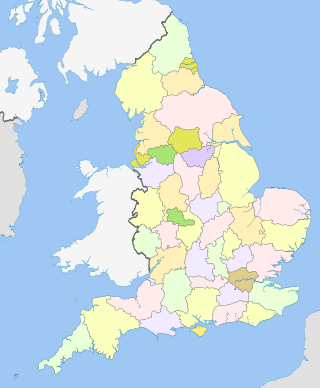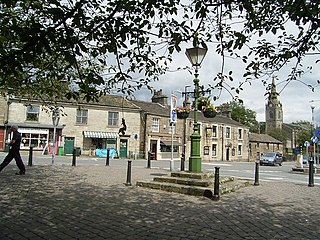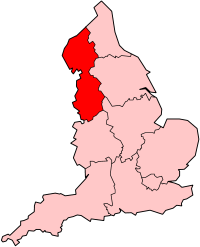Shire is a traditional term for an administrative division of land in Great Britain and some other English-speaking countries such as Australia and the United States. It is generally synonymous with county. It was first used in Wessex from the beginning of Anglo-Saxon settlement, and spread to most of the rest of England in the tenth century. In some rural parts of Australia, a shire is a local government area; however, in Australia it is not synonymous with a "county", which is a lands administrative division.

Lancashire is a ceremonial county in North West England. It is bordered by Cumbria to the north, North Yorkshire and West Yorkshire to the east, Greater Manchester and Merseyside to the south, and the Irish Sea to the west. The largest settlement is Blackpool, and the county town is the city of Preston.

Metropolitan counties are a subdivision of England which were originally used for local government. There are six metropolitan counties: Greater Manchester, Merseyside, South Yorkshire, Tyne and Wear, West Midlands and West Yorkshire.

The historic counties of England are areas that were established for administration by the Normans, in many cases based on earlier kingdoms and shires created by the Angles, Saxons, Jutes, Celts and others. They are alternatively known as ancient counties, traditional counties, former counties or simply as counties. In the centuries that followed their establishment, as well as their administrative function, the counties also helped define local culture and identity. This role continued even after the counties ceased to be used for administration after the creation of administrative counties in 1889, which were themselves amended by further local government reforms in the years following.

The counties of England are divisions of England. There are currently 48 ceremonial counties, which have their origin in the historic counties of England established in the Middle Ages. The current ceremonial counties are the result of the Lieutenancies Act 1997 and are based on the Local Government Act 1972 administrative counties which included a number of new counties such as Greater Manchester and Tyne and Wear. However, some counties introduced by the Local Government Act 1972, including Avon, Cleveland and Humberside no longer exist. The term "county", relating to any of its meanings, is used as the geographical basis for a number of institutions such as police and fire services, sports clubs and other non-government organisations.

Ceremonial counties, formally known as counties for the purposes of the lieutenancies, are areas of England to which lord-lieutenants are appointed. A lord-lieutenant is the monarch's representative in an area. Shrieval counties have the same boundaries and serve a similar purpose, being the areas to which high sheriffs are appointed. High sheriffs are the monarch's judicial representative in an area.

The Local Government Act 1972 is an act of the Parliament of the United Kingdom that reformed local government in England and Wales on 1 April 1974. It was one of the most significant Acts of Parliament to be passed by the Heath Government of 1970–74.

Littleborough is a town in the Metropolitan Borough of Rochdale, Greater Manchester, England, in the upper Roch Valley by the foothills of the South Pennines, 3 miles (4.8 km) northeast of Rochdale and 13 miles (20.9 km) northeast of Manchester; Milnrow and the M62 motorway are to the south, and the rural uplands of Blackstone Edge to the east. According to the 2001 census, Littleborough, and its suburbs of Calderbrook, Shore and Smithy Bridge, had a population of 13,807.
Chapman codes are a set of 3-letter codes used in genealogy to identify the administrative divisions in the United Kingdom, Ireland, the Isle of Man and the Channel Islands.
A lord-lieutenant is the British monarch's personal representative in each lieutenancy area of the United Kingdom. Historically, each lieutenant was responsible for organising the county's militia. Lord-lieutenant is now an honorary titular position usually awarded to a retired notable person in the county.

Metropolitan and non-metropolitan counties are one of the four levels of subdivisions of England used for the purposes of local government outside Greater London and the Isles of Scilly. As originally constituted, the metropolitan and non-metropolitan counties each consisted of multiple districts, had a county council and were also the counties for the purposes of Lieutenancies. Later changes in legislation during the 1980s and 1990s have resulted in counties with no county council and 'unitary authority' counties with no districts. Counties for the purposes of Lieutenancies are now defined separately, based on the metropolitan and non-metropolitan counties.
England is divided by a number of different regional schemes for various purposes. Since the creation of the Government Office Regions in 1994 and their adoption for statistical purposes in 1999, some historical regional schemes have become obsolete. However, many alternative regional designations also exist and continue to be widely used.

Scouting in North West England is about Scouting in the official region of North West England. It is largely represented by the Scout Association of the United Kingdom and some Groups of traditional Scouting including the British Boy Scouts and British Girl Scouts Association, Baden-Powell Scouts' Association and the Federation of European Scouts.

The following outline is provided as an overview of and topical guide to England:

A combined authority is a type of local government institution introduced in England outside Greater London by the Local Democracy, Economic Development and Construction Act 2009. Combined authorities are created voluntarily and allow a group of local authorities to pool appropriate responsibility and receive certain delegated functions from central government in order to deliver transport and economic policy more effectively over a wider area.

The following is an alphabetical list of articles related to the United Kingdom.
The 2021 New Year Honours are appointments by some of the 16 Commonwealth realms to various orders and honours to recognise and reward good works by citizens of those countries. The New Year Honours are awarded as part of the New Year celebrations at the start of January and those for 2021 were announced on 30 December 2020.











